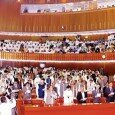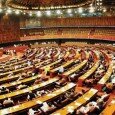By Tahir Niaz –
How bills are getting stuck in Senate
With the ruling PML-N only having sixteen seats in the Upper House of the Parliament, it could do little at the legislative front in its first parliamentary year. The ruling party struggled to get support of the opposition parties in the Senate, leading to important bills not being passed.
All the political stakeholders stand unanimous on eliminating terrorism from the country but differ in the means and method. The opposition parties have had real apprehensions over certain bills related to terrorism, 10 of these bills passed in the National Assembly could not be passed in the Senate.
The 14th National Assembly was sworn in on June 1, 2013. Mohammad Nawaz Sharif was sworn in as the Prime Minister with over 2/3rd majority. He is the only Prime Minister to have been elected to this office thrice. The 14th National Assembly completed its first parliamentary year on May 31, 2014. In these initial twelve months, the National Assembly passed only 10 government bills and none of them were approved by the Senate where the government lacks majority.
The situation is likely to continue until next the Senate elections in March 2015. The most high profile piece of proposed legislation was ‘The Protection of Pakistan Bill, 2014’ which was passed by the National Assembly on April 7, 2014. The other two prominent bills passed by the House during the first parliamentary year were ‘The Anti-Terrorism (Amendment) Bill, 2014’ and “The Anti-Terrorism (Second Amendment) Bill, 2014’. None of these could make it through the Senate.
The ‘Anti-Terrorism (Amendment) Bill’, 2014 talked of more legislative measures to enhance the effectiveness of the law-enforcing agencies in tackling heinous crimes, especially conferring powers of investigation upon the Rangers, providing legal cover to JIT and enabling police to become complainants in extortion cases.
According to Section 7 of the bill, screens may be used during trials to shield witnesses, judges and prosecutors from public view and that the trials may be held in jail premises or through video links. According to Section 9 of the bill, convictions may be given on the basis of electronic or forensic evidence. However, the opposition parties did not support this legislation in the Senate due to vocal and public reservations on other clauses.
The ‘Anti-Terrorism (Second Amendment) Bill, 2014’ called for the establishment of a government machinery to constantly review and strengthen counter-terrorism measures, particularly targeting militant financing, and bringing the entire system up to par with international standards.
The bill addressed shortcomings that relate to provisions on terrorist financing in the ‘Anti-Terrorism Act 1997’, shortcomings highlighted by the Financial Action Task Force or FATF, which is an international body comprising many countries and organizations that set and monitor international standards on combating money laundering and the financing of terrorism.
Under the legislation, money or property owned or controlled by proscribed organizations and persons was to be frozen or seized immediately by the relevant authorities. But the bill met the same aforementioned resistance in the Senate.
‘The Protection of Pakistan Bill, 2014’ drew the most criticism from opposition parties for being tacitly against fundamental human and civil rights. According to the government, the bill provided for protection against waging of war against Pakistan, prevention of acts threatening the security of Pakistan and for speedy trial of terrorism related offences. The bill provided for preventive detention, not exceeding ninety days, of people perceived to be acting in a manner that could threaten the integrity, security and society of Pakistan, interfering in the external affairs of Pakistan or disrupting public order and the provision of public supplies and services.
Under the said law, the burden of proof was on the accused. Furthermore, any member of the armed forces, on reasonable apprehension of a scheduled offence, after giving sufficient warning, would be entitled to use force to prevent the offence, and it would be considered lawful for any such officer to fire or order firing upon a scheduled offender.
The Senate objected vehemently to these last clauses. Clearly, the legislative houses have failed to move forward on combating terrorism on a united front. Regardless of the merits or demerits of the particular bills, and regardless of their necessity on the ground and what they would mean in practical terms for dealing with Pakistan’s biggest problem, it seems that bills are voted for or against purely on the basis of political alignment.
The PML-N flaunts it’s Lower House strength by pushing through hardboiled legislative proposals, and the Senate turns them down to counter the ruling party’s sense of federal strength.
The writer is a journalist based in Islamabad































































































